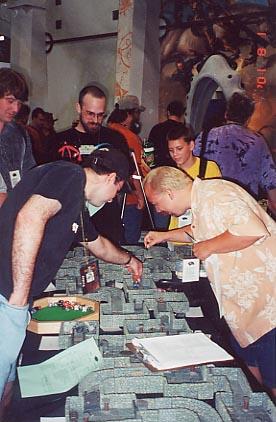|
|
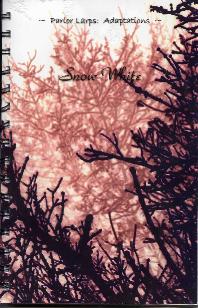
|
2005 Snow White
by J
I picked up this Parlor Larp (plus four others) at GenCon SoCal. I missed GenCon Indy because of Burning Man, but Shifting Forest Storyworks was there selling Snow White, so I think it counts as a legitimate pick of GenCon.
Snow White, like the other Parlor Larps, is a one-evening casual larp. What I like about Parlor Larps is that they give you a simple, packaged gaming experience that doesn't require a lot of effort to pull off. Another thing I like is that the designers are extremely intentional in their efforts to give players the right experience. For example, each character is coded for whether it's simple or complex and light or dark, so you can pick the character you like without having to know all the characters' details. What's more, there's actually a step where you answer open-ended questions about your character. That means that the characters are mostly prepackaged, but you get to personalize yours. A little personalization goes a long way to character immersion.
The Parlor Larps include some pretty dark and disturbing titles, which is fine by me.
[Shifting Forest has evidently gone out of business. If anyone knows how to get hold of the creators or to buy Parlor Larps, please post to my message boards. —JoT, 2006] |
|
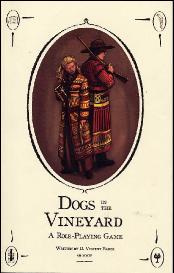
|
2004 Dogs in the Vineyard
by D. Vincent Baker
Dogs in the Vineyard is the latest from D. Vincent Baker, who brought us Kill Puppies for Satan. You play a roving guardian of spiritual order on the US frontier. Your land is a territory not yet constituted as a state, and your faith is the one true Faith. Your conflicts are personal and often involve shoot-outs.
I almost didn't pick Dogs because I didn't want a game with characters that the players couldn't respect. They sounded like thugs, Inquisitors in the American style. But it turns out that they're not thugs. They're righteous stalwarts and brave heroes. They root out and face down corruption with their hearts as well as their sidearms. The irony and anti-heroism I expected to find aren't in the game.
I almost didn't pick Dogs because it has a multi-stage, rules-loose game mechanic. I found the multi-stage, rules-loose mechanics of Dust Devils and HeroQuest to be unsatisfying. But Vincent demoed me the game, and it looks like a system that I could really use.
In case you haven't made the connection, the Faith in Dogs is parallel to the Mormon religion.
Vincent says that Dogs in the Vineyard is the exact opposite game from Kill Puppies for Satan, and it is.
Dogs in the Vineyard bears a clear resemblance to my own D&D campaign. The characters are the champions and enforcers of a faith that really is the One True Faith, heroes among their people, foes of demons. This resemblance is probably not a coincidence. Vincent and I are probably coming at the issue of religion and RPGs from roughly the same place.
Battle Dragons almost was my pick this year. It has keen lists of cool special abilities you can by for your dragon character, such as hellfire breath or death-beam eye rays. But I've been disappointed by the crunchy mechanics of promising picks before (see Obsidian and especially Abyss, below), so I went with Dogs. |
|
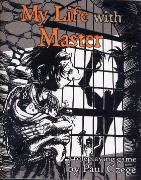
|
2003 My Life With Master
by Paul Czege, published by Half-Meme Press.
You are a minion, striving to overcome the master's power over you. At once free-form and structured, the mechanics resolve all conflicts as part of the minions' struggle against the master, and against their own self-loathing. Narration develops very quickly, and an entire campaign runs for maybe three sessions.
Review of MLWM
The new RPGs at this year's GenCon disappointed me. Other than My Life With Master, there weren't any other RPGs that were seriously in the running to be my pick for the year. Usually there are two or three new RPGs that I pick among. Maybe the problem this year was that Robin D. Laws and Aaron Rosenberg didn't have new RPGs out.
I was intrigued by Zero Movement from Pixie Dust Games. The characters are modern people mysteriously given supernatural powers. The campaign starts when the characters, and other people across the globe, have just gotten these powers. The PCs are in a position to make history, and how the world changes in response to these powers is partly up to them. The game has a tarot-based resolution system that looked kind of interesting. At GenCon, they had a prerelease "orientation kit." But the game seemed vague, so I went with Master, which is a lot more concrete.
There was also a cool-looking miniatures game featuring survivors with shotguns versus zombies. It has a playing-card-based mechanic. Unfortunately, the cards basically generate a number for you, like a die would. The more interesting things you can do with cards, like fold or husband resources, you can't do. For a while, I thought about buying the game so I could rework the system, but my better sense prevailed.
The new Tekumel game from Guardians of Order still isn't out, so I couldn't pick that, either.
|
|
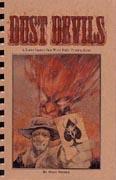
|
2002 Dust Devils
by Matt Snyder, published by Chimera Creative.
A wild west RPG but without the zombies. Each PC has a personal "devil," such as drinking, or being a wanted man. I don't think of it as a western RPG. It looks more like a character-driven RPG with no supernatural or science fiction elements—using the wild west as a its setting. (The wild west has a lot to recommend it as a setting for human drama.) I played it with mixed results.
Review |
|
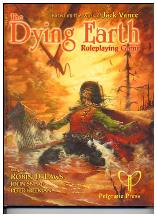
|
2001 Dying Earth RPG
by Robin D. Laws, published by Pelgrane Press
A game based on Jack Vance's colorful, fanciful Dying Earth fiction work, an RPG where persuasion replaces combat as the arena of struggle. I ran a four-hour game in which there was plenty of conflict and contention, but the only combat ended without a blow landed.
Review |
|
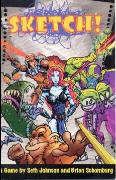
|
2000 Sketch
by Seth Johnson and Brian Schomburg, published by Corsair Publishing
Draw your superhero or supervillain. The other players vote on your character's stats, based on the drawing, and then you fight. The player-versus-player system (no GM) worked once, but I don't think it would work a second time. The mechanics aren't crunchy enough to rely on for a good fight, so you have to be creative
I'm not sure why I didn't pick Hero Wars, a collaboration between Greg Stafford and Robin D. Laws. Maybe because I'd already bought it by GenCon, and because Sketch! was something really new and different.
Review
|
|
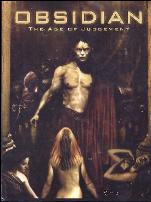
|
1999 Obsidian: Age of Judgement
by Micah Skaritka, published by Apophis Consortium
Cool stuff: demons, big guns, cultists with signature sacrificial blades. In Obsidian, cultists sacrifice souls to Hell, and in exchange they get a little bit of soul power for each sacrifice (a "finder's fee"). Magic is powered by damning souls to Hell. That's good action. Unfortunately, the book was laid out pretty badly, and it was a struggle to put a game together. The new edition is put together a lot better.
You can download the notes I made for the introductory adventure I ran.
In 2004, I ran a free-form Obsidian session. |
|
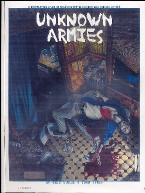
|
1998 Unknown Armies
by Greg Stolze and John Tynes, currently published by Atlas Games
I ran a creepy mystery. The mechanics work a little weird, but the rules for mental balance and insanity are pretty cool. One of the characters was a plutomancer with a casual attitude toward money. If I were to do it again, I'd coach the player to play him as superstitiously obsessive about money instead.
You can Download the notes I made for the introductory adventure I ran. |
|
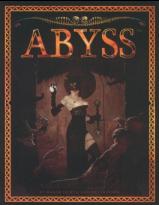
|
1997 Abyss
This game turned out to be so bad that I couldn't get a game together. I tried to imagine how the encounters would go, and it didn't fit together. An example of the game's sloppy design is the armor. You take more damage if you're wearing light armor than if you're wearing none. |
 |
—JoT
May, August, September 2002, August 2003
top |
|
|
















